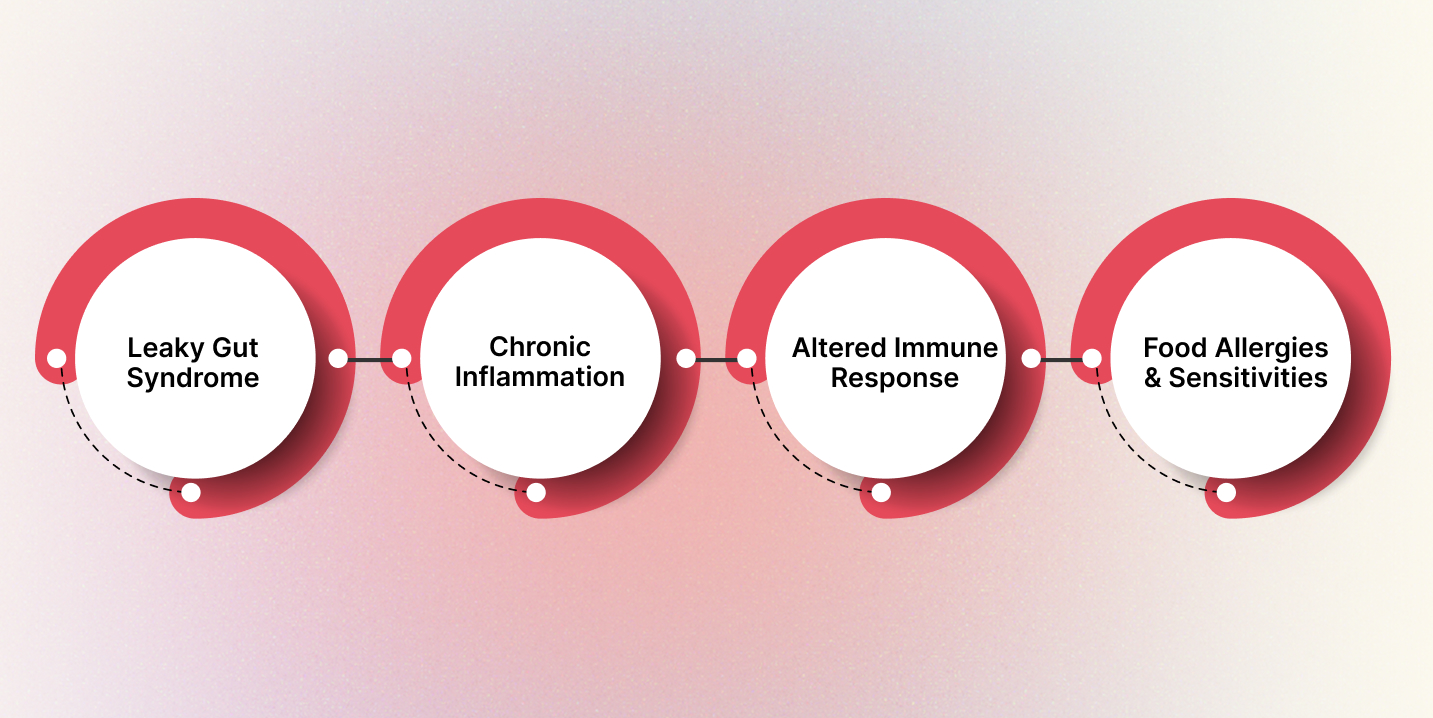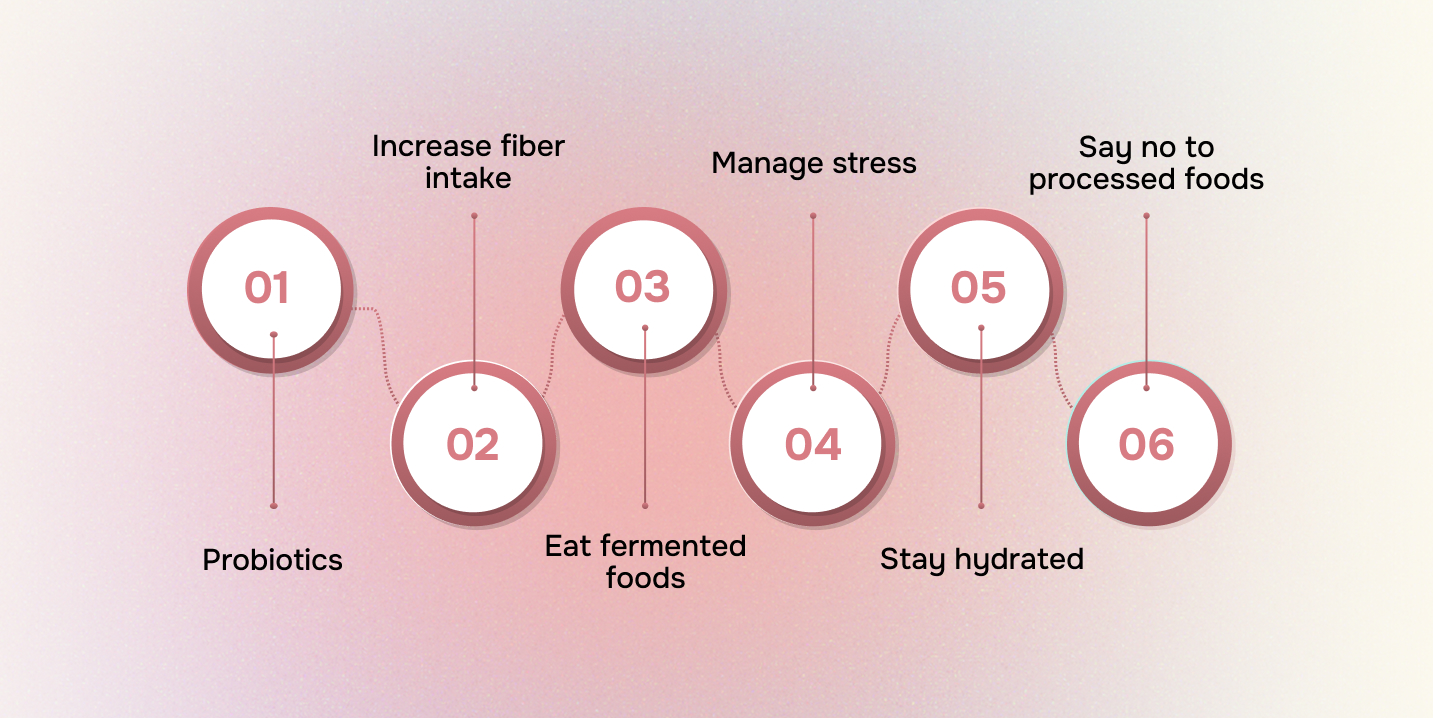Key Takeaways
-
Gut health significantly impacts allergies, as the gut microbiome influences immune responses
-
A gut bacteria imbalance (dysbiosis) can lead to allergic reactions by triggering inflammation
-
Poor gut health can worsen both seasonal and food allergies through systemic inflammation
-
Maintaining a healthy gut microbiome can reduce allergy symptoms by improving immune regulation
-
Simple steps like probiotics, a balanced diet, and stress management can support gut health and alleviate allergies
Allergies seem to be more common than ever, from sneezing fits during pollen season to food sensitivities. But have you ever thought that your gut health might be playing a bigger part in this than you realise? It might sound surprising, but research is showing that your gut microbiome, the community of bacteria and microorganisms living in your digestive system, could be the key to managing allergies more effectively.
Let’s understand how your gut could be influencing your allergies and explore simple ways to improve gut health for better allergy control.
What is gut health?
Before we jump into the connection with allergies, it’s important to understand what gut health actually means. Your gut health refers to the state of your digestive system, including the balance of good and bad bacteria in your intestines. These tiny microorganisms play an important role in digesting food, absorbing nutrients, and regulating your immune system. A healthy gut microbiome helps keep your immune system in check, while an imbalanced one can trigger a variety of issues, including allergies.
The link between gut health and allergies
Did you know that your gut could be influencing how your body reacts to allergens? Here’s how the health of your gut can play a major role in triggering or alleviating allergy symptoms:
-
Gut microbiome and immune function
Around 70% to 80% of your immune system is situated in your gut, meaning that a healthy gut directly influences how your immune system responds to allergens.
-
Dysbiosis triggers allergies
When the gut microbiome is imbalanced (dysbiosis), it can lead to an overactive immune response, causing allergies by reacting to harmless substances like pollen or dust.
-
Inflammation and allergy flare-ups
An unhealthy gut can lead to chronic inflammation, which can trigger or worsen allergic reactions by affecting various parts of the body, including the skin and respiratory system.
-
Gut-brain connection
Your gut and brain are connected via the gut-brain axis, meaning that poor gut health can lead to systemic inflammation that may worsen allergic symptoms, including seasonal and food allergies.
-
Gut health and food allergies
Gut microbiome imbalances can also affect the digestion and absorption of certain foods, potentially increasing the risk of developing food allergies or intolerances.
Your gut manages allergies by influencing immune responses. A balanced microbiome can help reduce the body’s tendency to overreact to allergens, making gut health a key factor in allergy management.
Also read: Probiotics for Food Allergies: Prevention and Treatment
Learn how probiotics can help prevent and treat food allergies by supporting gut health and enhancing your body’s immune response.
How poor gut health can lead to allergies

A compromised gut can set the stage for allergic reactions in multiple ways. When the balance of bacteria in the gut shifts, it can lead to a series of health issues that contribute to allergies.
Here’s how poor gut health can cause or worsen allergic symptoms:
-
Leaky gut syndrome
Leaky gut syndrome occurs when the lining of your intestines is damaged, allowing toxins, undigested food particles, and bacteria to enter the bloodstream. This triggers an immune response that leads to inflammation throughout the body. Leaky gut is linked to various allergic conditions because the body starts reacting to harmless substances as though they are threats.
-
Chronic inflammation
When your gut is out of balance, it can lead to chronic inflammation. This can affect other parts of the body as well, including the skin, respiratory system, and digestive system, leading to symptoms like rashes, swelling, and breathing difficulties, typical of allergic reactions.
-
Altered immune response
An imbalanced gut microbiome can lead to miscommunication between the gut and immune system. As a result, the immune system may produce more antibodies in response to harmless allergens, which can trigger symptoms of allergies. Essentially, poor gut health can cause your immune system to overreact, making it harder to cope with environmental factors.
-
Food allergies and sensitivities
The state of your gut microbiome can also influence how your body handles food. Gut bacteria imbalance can disrupt the digestive process and trigger food allergies or sensitivities. Conditions like gluten intolerance or dairy sensitivity may be connected to gut health, with an unhealthy gut potentially increasing your susceptibility to these issues.
Poor gut health can lead to multiple pathways that trigger allergies. Whether through leaky gut, inflammation, or an overactive immune response, maintaining a balanced gut is key to preventing and managing allergy symptoms.
To manage your allergies, supporting your gut microbiome is key. Try The Good Bug’s Gut Cleanse | 14 Prebiotic Colon Detox Shots to help detoxify your gut and promote a balanced microbiome, enhancing your immune system and potentially reducing allergy symptoms.
Steps to improve gut health for allergy relief

Now that we know how gut health can affect allergies, let’s explore some simple steps to improve your gut health and reduce allergy symptoms:
-
Probiotics
Probiotics are nothing but healthy bacteria that help balance your gut. By supporting your gut health, they boost your immune system and reduce inflammation. Research shows that probiotics can help ease allergy symptoms by regulating your immune response. You can get probiotics from foods like kefir, yogurt, and sauerkraut, or take them in supplement form.
-
Increase fiber intake
Eating more fiber is important for gut health. Fiber acts as food for beneficial gut bacteria and helps maintain a healthy gut lining. Add more fiber-rich foods like fruits, vegetables, legumes, and whole grains to your meals. These foods also support digestion, which can help reduce allergy symptoms linked to digestive issues.
-
Eat fermented foods
Fermented foods like kimchi, kombucha, and miso are rich in probiotics and prebiotics, which help nourish the good bacteria in your gut. These foods can help restore balance to the gut microbiome, boost immune function, and potentially reduce inflammation, which is linked to allergies.
-
Manage stress
Stress can negatively affect your gut health by disrupting the balance of gut bacteria, leading to issues like leaky gut and inflammation. Managing stress through activities like meditation, yoga, or deep breathing can help keep your gut healthy and reduce allergy symptoms.
-
Stay hydrated
Water is necessary for proper digestion and overall gut function. Drinking enough water helps flush out toxins, keeps the digestive system running smoothly, and supports a balanced gut microbiome. Staying hydrated also helps reduce bloating and inflammation, which can trigger allergic reactions.
-
Say no to processed foods
Processed foods like sugary snacks, fast food, and artificial additives can harm your gut health. They encourage the growth of bad bacteria, disrupt gut balance, and increase inflammation. Focus on whole, nutrient-rich foods to keep your gut healthy.
Improving gut health for allergy relief is achievable through simple lifestyle changes. By adding probiotics, fiber, fermented foods, and managing stress, you can support your gut and reduce allergic reactions. A little effort in improving gut health can go a long way in managing allergies.
To learn more about supporting your gut health, check out The “Fiber First” Trick Every Nutritionist Swears By for Weight Loss & Gut Health by The Good Bug.
At The Good Bug, we offer probiotics specifically designed to help balance your gut microbiome. Whether you're looking to reduce inflammation, boost your immune system, or simply support digestion, The Good Bug is here to help you take charge of your gut health.
Gut health is more important than ever when it comes to managing allergies. A balanced gut microbiome can help regulate your immune response and reduce allergic reactions. By incorporating healthy habits like taking probiotics, eating gut-friendly foods, and reducing stress, you can support your gut health and improve your allergy symptoms.
Ready to take control of your gut health? Explore The Good Bug’s probiotics to help support your immune system and relieve allergy symptoms today!
Frequently asked questions (FAQs)
-
How does gut health affect allergies?
Your gut plays an important role in the immune system, and when gut bacteria are imbalanced, it can trigger inflammation and cause an overactive immune response, resulting in allergies.
-
Can improving my gut health help with seasonal allergies?
Yes, improving gut health can help manage seasonal allergies by decreasing inflammation and boosting immune function.
-
What are the best foods to support gut health for allergy relief?
Fermented foods like yogurt, kefir, and kimchi, as well as fiber-rich fruits and vegetables, are great for improving gut health and reducing allergy symptoms.
-
How long does it take to see improvements in allergies by improving gut health?
Results can vary, but many people notice improvements in allergy symptoms within a few weeks to months of focusing on gut health.
-
Can probiotics really help reduce allergy symptoms?
Yes, probiotics help balance the gut microbiome, reduce inflammation, and support the immune system, leading to a reduction in allergy symptoms.


